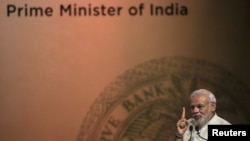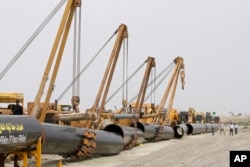Indian Prime Minister Narendra Modi will arrive Sunday in Iran in hopes of growing energy and development ties to the country as it emerges from its decades-long diplomatic isolation.
Iran and six world powers last year reached agreement on a plan that set limits on Iran's nuclear program. Since sanctions were lifted in January, the international community has begun re-engagement with Tehran.
On Monday, New Delhi said Modi is expected to sign a contract to build and run two terminals and cargo berths at Chabahar, a strategic Gulf of Oman port on Iran's southern coast.
Access for India
India has pushed hard for the project, which would give it access to central Asia and Afghanistan, the government said.
Afghan President Ashraf Ghani is also scheduled to arrive in Tehran Monday to sign a deal regarding the Chabahar port.
Gopal Baglay, New Delhi's Foreign Ministry official in charge of Iranian ties, said India would make an initial investment of more than $200 million in the port. "The focus of the trip is connectivity and infrastructure," he told Reuters Friday.
Chabahar is about 100 kilometers from Pakistan's Gwadar seaport, which is being jointly developed with China as part of the China-Pakistan Economic Corridor (CPEC).
CPEC is a $46 billion package of railroads, highways, pipelines, power plants and industrial zones. It also will give Beijing greater access through Pakistan to global markets, including Africa and Europe.
Oil payment
Last week, ahead of Modi's two-day trip, Indian refineries made the first payment – about $750 million – toward a $6.4 billion bill owed to Iran for crude imports, Reuters reported Saturday. The backlog of payments had accumulated while Iran was under Western sanctions.
The payment will be made in euros through a Turkish bank, Reuters said. While most international restrictions against Iran have been lifted, the United States maintains some sanctions and a trade embargo. That status means banks cannot use the U.S. dollar for any deals with Iran.
India is one of the biggest buyers of Iranian crude oil, with plans for the country to import at least 400,000 barrels per day from Iran in the fiscal year, Reuters reported.
Ayaz Gul in Islamabad contributed to this report. Some information for this report came from Reuters.






